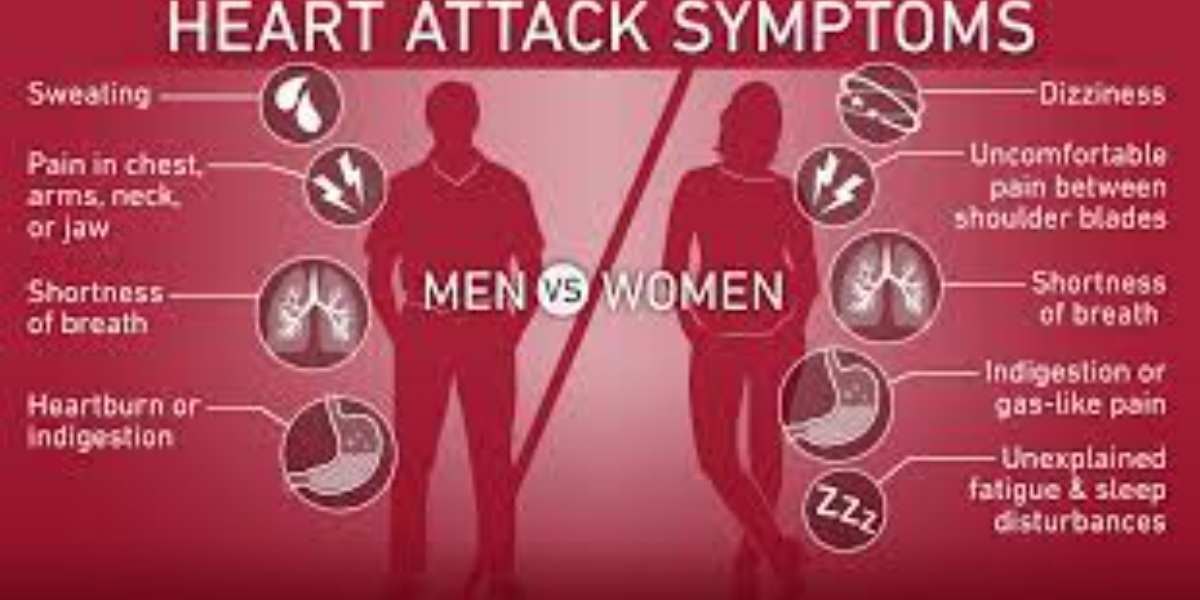A heart attack, or myocardial infarction, is a life-threatening medical emergency that claims lives across the globe. Recognizing the symptoms of a heart attack is crucial because early intervention can make the difference between life and death. This article aims to shed light on the various symptoms of a heart attack, from the classic signs to the subtler ones that are often overlooked, emphasizing the importance of timely medical attention.

The Exemplary Side effects
Chest Torment or Uneasiness: Maybe the most notable side effect of a respiratory failure is chest agony or inconvenience. The aggravation is much of the time portrayed as a weighty, pressing, or pounding sensation in the middle or left half of the chest. It might travel every which way or endure for a few minutes.
Emanating Agony: The aggravation might transmit to different region of the chest area, including the arms (typically the left arm yet once in a while the right), the neck, jaw, and, surprisingly, the back. This radiation of torment is a trademark element of a coronary episode.
Windedness: Many individuals experience shortness of breath alongside chest torment during a cardiovascular failure. It can happen previously or simultaneously as chest inconvenience. The individual might battle to slow down and rest or feel like they’re not able to take full breaths.
Different Side effects
While the exemplary side effects are all around perceived, not all respiratory failures present similarly. A few people might encounter subtler side effects, which can similarly life-compromise. It is imperative to know about these more subtle signs:
Sickness and Spewing: Feeling queasy or really heaving can be an indication of a coronary failure. These side effects are frequently confused with stomach related issues, creating a setback for looking for clinical assistance.
Wooziness or Discombobulation: Feeling woozy or dazed, particularly when it happens unexpectedly and without an evident reason, can be an indication of decreased blood stream to the cerebrum because of a coronary episode.
Outrageous Exhaustion: Significant and unexplained weakness, frequently more articulated in ladies, can be a side effect of a coronary failure. It might happen in the days or even weeks paving the way to the occasion.
Perspiring: Cold sweats or extreme perspiring, frequently depicted as “moist,” can go with a coronary failure. This side effect might happen no matter what the encompassing temperature.
Acid reflux or Indigestion: Certain individuals experience side effects that copy heartburn or indigestion during a cardiovascular failure. This can be especially confounding, prompting a postponed reaction.
Uneasiness or a Feeling of Looming Destruction: A feeling of approaching destruction or outrageous tension can now and then be a side effect of a cardiovascular failure. It’s critical to pay attention to your gut feelings assuming you feel that something is truly off-base.
Quiet Coronary episodes
At times, people experience what is known as a “quiet coronary failure.” These respiratory failures happen without the common chest agony and distress, making them trying to distinguish. They are more normal in individuals with diabetes, more seasoned grown-ups, and those with prior heart conditions.
The shortfall of perceptible side effects can prompt a postponed finding, possibly making greater harm the heart muscle. Standard clinical check-ups and conversations with medical services suppliers about risk factors are significant in recognizing quiet coronary failures.
Distinctions in sexual orientation
It is fundamental to perceive that the side effects of a respiratory failure can shift among people. Ladies frequently present with subtler side effects and are bound to encounter side effects like windedness, queasiness, regurgitating, outrageous weakness, and agony in the jaw or back. These abnormal side effects can prompt underdiagnosis in ladies, featuring the significance of orientation explicit mindfulness and training.
When to Look for Help
Perceiving the side effects of a coronary failure is just a portion of the fight; acting instantly is similarly basic. In the event that you or somebody you are with encounters any of the side effects referenced, it is fundamental to:
Call 911: Don’t endeavor to head to the clinic yourself. Crisis clinical benefits can give prompt clinical consideration and life-saving mediations.
Bite Ibuprofen: In the event that you have headache medicine accessible and are not unfavorably susceptible, biting an ibuprofen can help by diminishing the blood and further developing blood stream.
Remain cool-headed: Frenzy can compound the circumstance. Remain as quiet as could be expected, and center around getting the essential clinical assistance.

Counteraction and Mindfulness
Forestalling coronary failures implies overseeing risk factors, for example, hypertension, elevated cholesterol, diabetes, corpulence, and an inactive way of life. Standard activity, a decent eating regimen, and stopping smoking can essentially lessen the gamble of a coronary episode.
Familiarity with the side effects of a cardiovascular failure is similarly essential. Government funded schooling efforts and individual mindfulness can save lives. It’s memorable’s pivotal that cardiovascular failures can influence individuals of any age and foundations. By understanding the scope of side effects, we can make a stride nearer to early recognition and a superior opportunity at recuperation.
End
A cardiovascular failure is a perilous occasion that requests quick activity. Perceiving the side effects is the most vital move toward convenient clinical mediation, which can have a significant effect in endurance and recuperation. Whether the side effects are exemplary or unpretentious, monitoring the signs and knowing when to look for assist with canning save lives. Training, avoidance, and quick reaction are the keys to fighting this quiet executioner.
